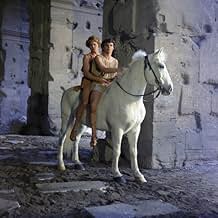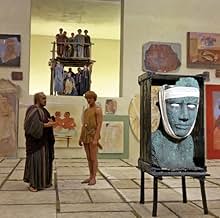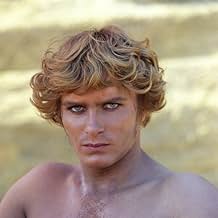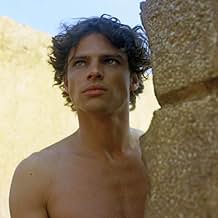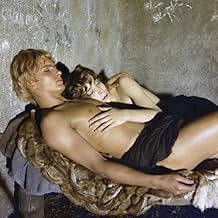Una serie de relatos míticos independientes ambientados en la Roma del siglo I.Una serie de relatos míticos independientes ambientados en la Roma del siglo I.Una serie de relatos míticos independientes ambientados en la Roma del siglo I.
- Dirección
- Guión
- Reparto principal
- Nominado para 1 premio Óscar
- 5 premios y 8 nominaciones en total
- Trimalcione
- (as Il Moro)
- Scintilla
- (as Danica la Loggia)
- La matrona
- (as Lucia Bosé)
- Il suicida
- (as Joseph Weelher)
- Minotauro
- (as Luigi Montefiori)
Reseñas destacadas
The film is freely adapted from Petronius' book, which is the exploits of two young Romans, Ascilto and Encolpio, as they venture throughout the empire, indulging in both heterosexual and homosexual relationships In the course of this proliferation of sensuality, Ascilto becomes impotent and madly goes for a cure which ends in tragedy for Encolpio
The movie's treatment of the sexual decadence is remarkably powerful without being explicit In fact, in light of the mental images it presents, it actually puts on view very little on screen But there is a great quantity of mysterious whores, hedonists, gluttons, and gross indulgence in carnal pleasure In the midst of this chaos, however, there is a beautifully light reprieve as the young Romans come across a forsaken villa... A very charming slave girl has remained behind, and she playfully troubles the two men into an erotic game
Apart from that, the sex is portrayed as bizarre, tempting, suggestive of hidden secrets, violating the rules of morality, and going beyond the limit
"Satyricon" feels empty, loud, and shallow. I rather read Petronius's book or watch the immortal, impressive, and full of character El Fayum portraits.
I prefer more " Fellini's Roma" as beautiful as "Satyricon", it is much more enjoyable, has a subtle message and a lot of heart and magnificent Eternal City is deservingly the only main character of Maestro Fellini's very personal film.
¿Sabías que...?
- CuriosidadesGian Luigi Polidoro registered the title Satyricon (1969) for his movie first. Federico Fellini fought to use the title for his movie but lost the case. Subsequently the title was changed to Fellini Satyricon.
- PifiasIn one version, Joseph Wheeler is credited as 'Joseph Weelher'.
- Citas
Soldier at Tomb: They've stolen the hanged man! While I was with you, the thief's family took him away! I know what punishment I'll get... a horrible death. Why should I wait for it? I'd rather die by my own hands.
[pulls his sword out and is about to stab himself]
Wife of Ephesus: [stops him] No! No, my dear... To lose the two men in my life, one after the other, would be too much...
Wife of Ephesus: [looks at the corpse of her husband] Better to hang a dead husband than to lose a living lover.
[the couple replace the missing hanged corpse with the corpse of her husband]
- ConexionesEdited into Federico Fellini: I'm a Born Liar (2002)
- Banda sonoraThe Drums for the Niegpadouda Dance
From Anthology of Music of Black Africa
Recorded by Everest Records
Arranged by Bernard C. Salomon
Published by Arvon Music
Selecciones populares
- How long is Fellini's Satyricon?Con tecnología de Alexa
Detalles
Taquilla
- Presupuesto
- 3.000.000 US$ (estimación)
- Recaudación en Estados Unidos y Canadá
- 1.135.943 US$
- Recaudación en todo el mundo
- 1.138.108 US$
- Duración2 horas 9 minutos
- Mezcla de sonido
- Relación de aspecto
- 2.35 : 1
Contribuir a esta página







